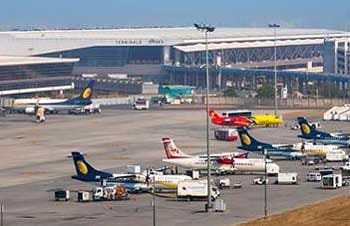INVC NEWS
New Delhi – On Saturday, a chilling wave of panic spread across airports as more than 31 flights faced bomb threats, leading to widespread disruption for passengers traveling from Patna to Bengaluru and even as far as Colombo, the capital of Sri Lanka. What was expected to be a routine travel day quickly escalated into a day filled with delays, security evacuations, and fear as multiple flights were forced to undergo stringent security checks to ensure the safety of passengers and crew.
Emergency Protocols Activated Across Multiple Airports
In light of the bomb threats, authorities swiftly responded by activating emergency protocols across affected airports. Planes were promptly isolated upon landing, passengers were evacuated, and thorough inspections were conducted to confirm the safety of each aircraft. This process, while essential, caused significant delays and considerable distress to hundreds of passengers, many of whom were left stranded for hours as the security process unfolded.
Airlines such as Akasa Air, IndiGo, Air India, and Vistara were among the most affected, with their flights receiving direct threats of explosives. Flights from both domestic and international routes were targeted, further complicating the situation as security personnel worked tirelessly to manage the crisis.
Bomb Threats Spread From Patna to Bengaluru and Beyond
The threats were not confined to a single region, adding to the complexity of the situation. Flights were impacted from Patna, a major hub in Bihar, to Bengaluru, the bustling IT city in Karnataka, and even reached as far as Colombo in Sri Lanka. Airports in these regions faced immediate pressure to ensure passenger safety while minimizing panic.
In Colombo, for instance, an emergency declaration was made at the Colombo International Airport, where the authorities isolated all arriving flights to undergo rigorous security checks. The airport’s emergency procedures ensured that each flight was carefully screened before being cleared for departure or further boarding.
Hundreds of Passengers Stranded Amidst Security Checks
As expected, these events caused significant disruptions for the hundreds of passengers on board these flights. Many were forced to disembark, spending hours in airport waiting areas while the planes were cleared by security teams. The sudden halt in operations left travelers—many of whom were women, children, and elderly individuals—facing long waits with little information about when they could continue their journeys.
For some, these delays led to missed connecting flights, canceled plans, and an overwhelming sense of anxiety as they navigated the uncertainty brought about by the bomb threats.
Major Airlines Targeted in the Bomb Threats
It wasn’t just smaller, regional flights that were affected. Some of the most prominent names in the aviation industry were forced to halt operations and follow stringent security protocols. Air India, Akasa Air, IndiGo, Vistara, and even international operators such as SpiceJet and Star India received bomb threats over the course of the day.
Each airline took immediate steps to protect passengers and ensure the safety of their aircraft. Flights from cities like Darbhanga and Chandigarh, as well as major hubs like Bengaluru, were all placed under high alert, with stringent protocols enforced before any further takeoff or landing procedures could take place.
Over 70 Flights Threatened in One Week
Shockingly, this was not an isolated incident. In the week leading up to Saturday’s chaos, over 70 flights had received bomb threats, sending shockwaves through the aviation industry. While many of these threats were later determined to be hoaxes, each one required a thorough and time-consuming investigation, leaving airlines scrambling to maintain their schedules and minimize disruptions.
Vistara Airlines reported that as many as five international flights faced security threats, including high-profile routes to destinations like Frankfurt, Singapore, Bangkok, and Colombo. Likewise, IndiGo Airlines confirmed that four flights had received security alerts, prompting additional delays and flight cancellations.
Heightened Security Measures Implemented
In response to the spate of threats, airports across India and Sri Lanka have ramped up their security measures. Authorities are now requiring more extensive pre-boarding checks, enhanced luggage screening processes, and closer surveillance of suspicious activity. While these measures are necessary to protect passengers, they have resulted in longer wait times at airports, contributing to the frustration already felt by many travelers.
For example, at the Colombo International Airport, stringent new procedures have been put in place, including dedicated bomb detection units and more comprehensive background checks for all passengers boarding international flights. Similar protocols have been implemented at airports across India, with a special focus on high-traffic hubs like Bengaluru, Chandigarh, and Patna.
Authorities Launch Investigations Into Bomb Threats
Local and international authorities are now conducting joint investigations to determine the origins of these bomb threats. Law enforcement agencies are working around the clock to identify those responsible for the terrorizing calls that led to the mass disruptions.
While no explosive devices have been found so far, authorities are treating each threat with the utmost seriousness to ensure the safety of passengers and crew. The Bureau of Civil Aviation Security (BCAS), along with other relevant agencies, is closely monitoring the situation, and extra personnel have been deployed at key airports to mitigate any further risks.
Impact on Airlines and Travelers
The aviation industry has been particularly hard hit by these bomb threats. Airlines, already grappling with high operational costs and post-pandemic recovery, now face additional pressure to ensure passenger safety while managing operational delays and canceled flights. This has not only impacted their day-to-day functioning but has also hurt their bottom line, as many travelers demand refunds, rebookings, and compensation for their disrupted journeys.
Meanwhile, passengers are left feeling frustrated and vulnerable, uncertain about the safety of their upcoming flights. As airports continue to experience heightened security checks and flight delays, travelers are urged to arrive at airports earlier than usual and prepare for extended waits due to the new security protocols in place.
















